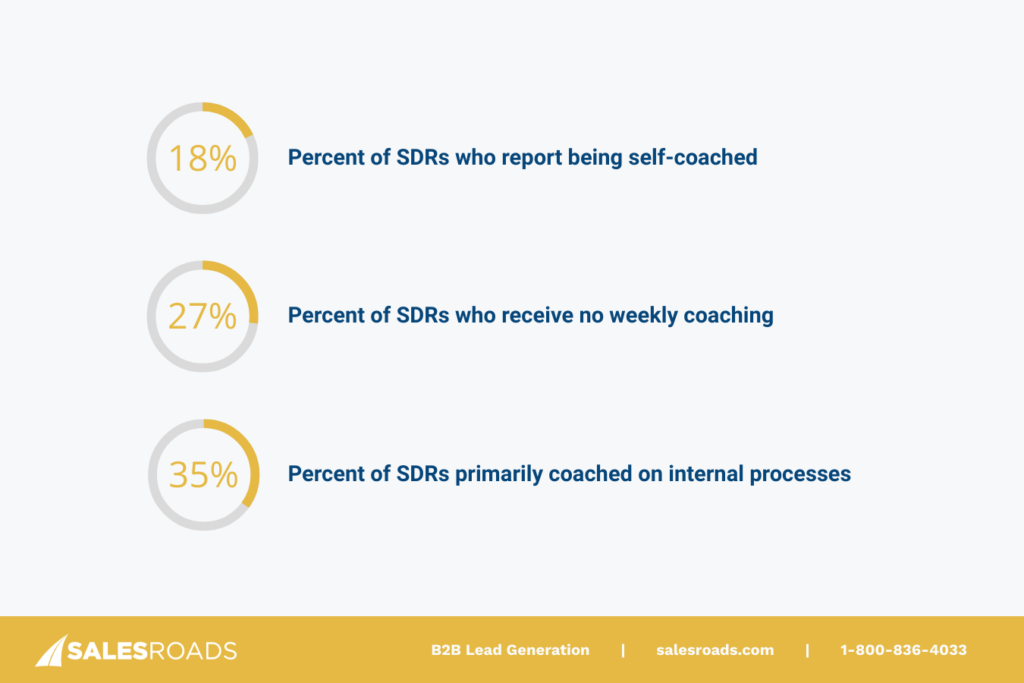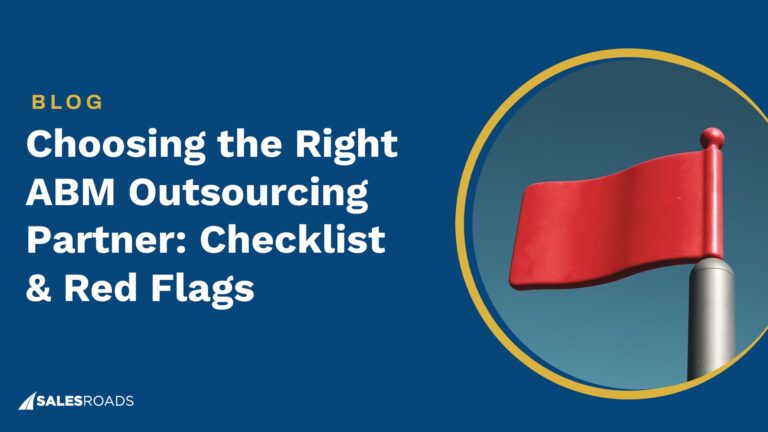Not all sales reps have the opportunity to receive ongoing training and coaching. Many companies leave this responsibility to their reps, often neglecting to allocate a budget for regular development.
Our whitepaper, “The State of SDR Hiring and Talent Development,” uncovers a troubling trend: despite the well-documented benefits of regular coaching, more than a quarter (26.9%) of sales reps say they don’t receive any coaching on a weekly basis. Even more concerning, 18.1% report they’re left to coach themselves.
This gap underscores an urgent need for companies to take action and offer structured, consistent training and development.

A solid sales training and coaching plan is crucial not only for driving ongoing growth and adaptability among sales reps but also for playing a key role in retaining top talent.
Types of B2B Sales Training
Understanding the different types of training available is crucial for developing a robust sales team. From skill-based sessions to customized coaching, each type addresses unique aspects of sales proficiency.
David Kreiger, President of SalesRoads, talks with Victoria McGlone about the future of sales training.
Implementing the right mix can significantly enhance your team’s effectiveness and tackle specific sales challenges.
Skill-Based Training
Skill-based training focuses on developing core sales skills essential for success. This includes mastering techniques such as effective prospecting, negotiation, and closing strategies. Training sessions are designed to enhance practical abilities through role-playing, simulations, and hands-on exercises.
By honing these skills, sales professionals can tackle common B2B sales challenges and improve their overall performance.
Product and Industry Training
Product and industry training provides in-depth knowledge about the products or services your company offers and the industry in which you operate. This type of training ensures that sales professionals can effectively communicate value propositions and address client needs.
Understanding product specifics and industry trends equips your team to overcome objections and build stronger customer relationships, crucial for overcoming B2B sales challenges.
Technology Training
With the increasing reliance on technology in sales processes, technology training has become indispensable. This involves familiarizing your team with CRM systems, sales automation tools, and data analytics platforms.
Effective technology training ensures that your sales team can leverage these tools to streamline workflows, analyze performance metrics, and improve overall efficiency, aligning with sales training best practices.
Soft Skills Training
Soft skills training is essential for fostering interpersonal skills that drive successful client interactions. This includes developing emotional intelligence, communication skills, and problem-solving abilities.
Sales professionals with strong soft skills are better equipped to build rapport, handle objections, and create positive client experiences. Investing in soft skills training addresses key B2B sales challenges by enhancing relationship-building and customer satisfaction.
Customized Coaching
Customized coaching offers tailored guidance to address specific needs and goals of individual sales team members. This approach involves one-on-one sessions with a coach who provides personalized feedback and strategies based on performance assessments.
Customized coaching helps in refining skills, overcoming individual challenges, and achieving targeted sales goals, making it a valuable component of any B2B sales training program.
Core Sales Training Techniques
Implementing core training techniques is essential for developing high-performing sales teams. By focusing on strategic areas such as sales strategy, communication, and negotiation, you can enhance your team’s skills and address key sales challenges.
Tailoring these techniques to your team’s needs will drive better results and improve overall sales performance.
Developing a Strong Sales Strategy
A solid sales strategy is the foundation of successful sales performance. Train your team to create and implement a comprehensive strategy that aligns with company goals and targets specific market segments. Encourage them to analyze market trends, define clear objectives, and identify KPIs.
Utilizing sales training best practices, such as SWOT analysis and competitive benchmarking, can help in crafting a strategic approach that addresses potential challenges and drives sustainable growth.
David Kreiger, President of SalesRoads, chats with Ralph Barsi about building strategy using three key frameworks.
Effective Communication Skills
Effective communication is crucial for successful sales interactions. Equip your team with skills to articulate value propositions clearly, listen actively, and tailor messages to diverse audiences. Training should include techniques for persuasive storytelling, overcoming objections, and adapting communication styles based on client needs.
Role-playing exercises and feedback sessions can enhance these skills, helping reps build stronger relationships and improve their overall effectiveness in engaging with prospects and clients.
Product Knowledge and Expertise
Deep product knowledge is vital for building credibility and trust with clients. Ensure your team receives thorough training on your products or services, including features, benefits, and differentiators. Encourage them to stay updated on industry developments and competitive offerings.
Providing access to product documentation, case studies, and regular updates will enhance their expertise and enable them to address client queries effectively. This expertise will empower reps to position your solutions more convincingly and address client pain points with confidence.
Building and Nurturing Client Relationships
Building and maintaining strong client relationships is key to long-term success in B2B sales. Train your team on relationship management strategies, including personalized follow-ups, regular check-ins, and proactive problem-solving. Emphasize the importance of understanding client needs and delivering value beyond the initial sale.
Implementing strategies for nurturing these relationships, such as creating customized success plans and offering ongoing support, can drive client satisfaction and loyalty. Incorporating these techniques into your sales coaching will help reps foster deeper connections and improve client retention.
Negotiation Skills and Closing Techniques
Negotiation skills and effective closing techniques are crucial for sealing deals. Provide training that covers negotiation strategies, such as finding win-win solutions, handling objections, and leveraging data to support your position.
Role-playing various scenarios can help reps practice and refine their approach. Emphasize the importance of understanding client motivations and using closing techniques that resonate with their needs.
Best Practices for B2B Sales Training Programs
Implementing effective B2B sales training programs requires a strategic approach to ensure your team develops the necessary skills and achieves sales goals.
Adopting best practices tailored to your organization’s needs can enhance training outcomes and address common b2b sales challenges.
Customized Training Programs
Customized training programs address the specific needs of your sales team, enhancing relevance and impact.
Start by assessing your team’s strengths and weaknesses to tailor the content accordingly. Develop training modules that align with your company’s sales strategy, target market, and product offerings. Incorporate real-life scenarios and role-playing to address unique challenges your reps face.
By personalizing the training, you ensure that your team receives the most relevant and actionable insights, which can significantly improve B2B sales skills and performance.
Regular Training and Refreshers
Sales techniques and market dynamics constantly evolve, making regular training and refreshers essential. Schedule ongoing training sessions to keep your team updated on the latest sales strategies, product updates, and industry trends. Incorporate refresher courses to reinforce key concepts and address new challenges as they arise.
Regularly updating your training materials and practices ensures your team remains agile and well-prepared to tackle evolving sales challenges. This continuous learning approach helps maintain high levels of engagement and skill proficiency among your sales reps.
Utilizing Technology and Sales Tools
Incorporating technology and sales tools into your training program can enhance efficiency and effectiveness. Equip your team with CRM systems, sales enablement tools, and data analytics platforms to streamline their workflows. Provide training on how to leverage these tools to manage leads, track performance, and analyze sales data.
Utilizing technology not only supports training but also helps reps stay organized and make data-driven decisions. Regularly review and update the tools and technology to ensure they align with your sales goals and best practices.
Mentorship and Peer Learning
Mentorship and peer learning are powerful components of a successful sales training program. Pair less experienced reps with seasoned mentors who can provide guidance, share best practices, and offer support. Encourage peer learning through team meetings, workshops, and collaborative projects.
This approach fosters knowledge sharing and skill development, allowing reps to learn from each other’s experiences. Incorporating mentorship and peer learning into your sales coaching enhances team cohesion and accelerates professional growth.
Measuring Training Effectiveness
Measuring the effectiveness of your sales training program is crucial for continuous improvement.
Implement metrics such as performance benchmarks, training completion rates, and feedback surveys to evaluate the impact of the training. Track changes in sales performance, deal closure rates, and skill application to assess the program’s success. Use this data to make informed adjustments to your training strategy, ensuring it addresses current challenges and aligns with sales training best practices.
Regularly reviewing training effectiveness helps maintain high standards and optimize your sales training efforts.
Bottom Line
B2B sales training is not a minor asset you can afford to overlook. Failing to invest in your reps doesn’t save money—instead, it leaves your team inadequately prepared, which ultimately impacts your bottom line and results in lost opportunities.
Ongoing sales training and customized coaching are essential for enhancing your team’s skills and bridging gaps in their knowledge. By prioritizing these investments, you ensure your reps are equipped to excel, creating a successful, revenue-generating team that drives long-term growth and profitability.










